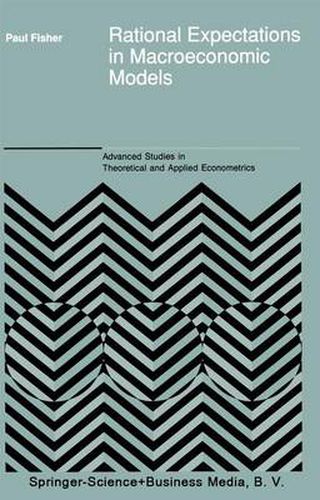Readings Newsletter
Become a Readings Member to make your shopping experience even easier.
Sign in or sign up for free!
You’re not far away from qualifying for FREE standard shipping within Australia
You’ve qualified for FREE standard shipping within Australia
The cart is loading…






This title is printed to order. This book may have been self-published. If so, we cannot guarantee the quality of the content. In the main most books will have gone through the editing process however some may not. We therefore suggest that you be aware of this before ordering this book. If in doubt check either the author or publisher’s details as we are unable to accept any returns unless they are faulty. Please contact us if you have any questions.
It is commonly believed that macroeconomic models are not useful for policy analysis because they do not take proper account of agents’ expectations. Over the last decade, mainstream macroeconomic models in the UK and elsewhere have taken on board the “Rational Expectations Revolution’ by explicitly incorporating expectations of the future. In principle, one can perform the same technical exercises on a forward expectations model as on a conventional model – and more!
Rational Expectations in Macroeconomic Models deals with the numerical methods necessary to carry out policy analysis and forecasting with these models. These methods are often passed on by word of mouth or confined to obscure journals.
Rational Expectations in Macroeconomic Models brings them together with applications which are interesting in their own right. There is no comparable textbook in the literature.
The specific subjects include: (i) solving for model consistent expectations; (ii) the choice of terminal condition and time horizon; (iii) experimental design: i.e., the effect of temporary vs permanent, anticipated vs. unanticipated shocks; deterministic vs. stochastic, dynamic vs. static simulation; (iv) the role of exchange rate; (v) optimal control and inflation-output tradeoffs. The models used are those of the Liverpool Research Group in Macroeconomics, the London Business School and the National Institute of Economic and Social Research.
$9.00 standard shipping within Australia
FREE standard shipping within Australia for orders over $100.00
Express & International shipping calculated at checkout
This title is printed to order. This book may have been self-published. If so, we cannot guarantee the quality of the content. In the main most books will have gone through the editing process however some may not. We therefore suggest that you be aware of this before ordering this book. If in doubt check either the author or publisher’s details as we are unable to accept any returns unless they are faulty. Please contact us if you have any questions.
It is commonly believed that macroeconomic models are not useful for policy analysis because they do not take proper account of agents’ expectations. Over the last decade, mainstream macroeconomic models in the UK and elsewhere have taken on board the “Rational Expectations Revolution’ by explicitly incorporating expectations of the future. In principle, one can perform the same technical exercises on a forward expectations model as on a conventional model – and more!
Rational Expectations in Macroeconomic Models deals with the numerical methods necessary to carry out policy analysis and forecasting with these models. These methods are often passed on by word of mouth or confined to obscure journals.
Rational Expectations in Macroeconomic Models brings them together with applications which are interesting in their own right. There is no comparable textbook in the literature.
The specific subjects include: (i) solving for model consistent expectations; (ii) the choice of terminal condition and time horizon; (iii) experimental design: i.e., the effect of temporary vs permanent, anticipated vs. unanticipated shocks; deterministic vs. stochastic, dynamic vs. static simulation; (iv) the role of exchange rate; (v) optimal control and inflation-output tradeoffs. The models used are those of the Liverpool Research Group in Macroeconomics, the London Business School and the National Institute of Economic and Social Research.